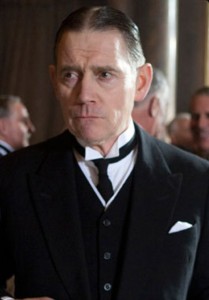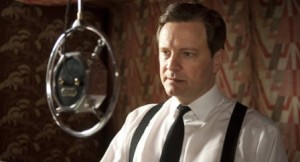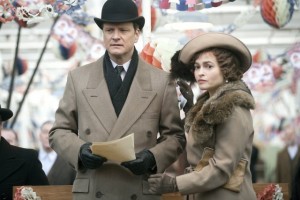 A gaunt, overly made up Anthony Andrews is Stanley Baldwin. Timothy Spall is Winston Churchill. Although there are numerous technical mistakes and anachronisms in the film, the one which immediately jumped out at me was the screen Churchill’s opposition to the king retaining the throne while married to the twice-divorced Simpson. In fact, Churchill supported Edward’s early efforts to keep both the throne and his American woman. Not until well after World War II did Churchill become a Knight of the Garter, or “Sir.”
A gaunt, overly made up Anthony Andrews is Stanley Baldwin. Timothy Spall is Winston Churchill. Although there are numerous technical mistakes and anachronisms in the film, the one which immediately jumped out at me was the screen Churchill’s opposition to the king retaining the throne while married to the twice-divorced Simpson. In fact, Churchill supported Edward’s early efforts to keep both the throne and his American woman. Not until well after World War II did Churchill become a Knight of the Garter, or “Sir.”
It’s somewhat mystifying—and often confusing—to realize that all these characters, if I may call them “characters,” were real people. All are dead now, except one, one of Bertie’s two daughters who is now Queen Elizabeth II.
And, as a footnote, though I have not researched the history or cause of Bertie’s stammer, I’ve often wondered if it somehow resulted from that terrible habit of European royals intermarrying, which led, and perhaps is still leading, to all sorts of physical and mental deformities. The Hapsburgs of Austria were the worst inbreeders, but Queen Victoria, for one, passed on hemophilia to three of her children. Remember that the current queen is the great-great-granddaughter of Victoria.
A downer, that subject? Perhaps. But so is the rather nondescript soundtrack by Alexandre Desplat. I don’t recall his music from The King’s Speech—honest, either indicative of its banality or a musical deficiency on my part. What highlights Desplat’s shortcomings, much like in Master and Commander where three contemporary composers went up against Ralph Vaughan Williams, Monsieur Desplat comes off way down the line from third best, compared with, in his case, Mozart and Beethoven—double doses of each!
 There is, of course, the one instance of source music. To work on his stammer, Bertie speaks into a modern recording device “from America,” as Lionel attributes it, simultaneously with Mozart’s The Marriage of Figaro Overture. (In the theater the volume at this point was excruciatingly, unbearably LOUD, as it would be again later.) A bit of that same Austrian’s Clarinet Concerto is heard as part of the score during Bertie’s lessons.
There is, of course, the one instance of source music. To work on his stammer, Bertie speaks into a modern recording device “from America,” as Lionel attributes it, simultaneously with Mozart’s The Marriage of Figaro Overture. (In the theater the volume at this point was excruciatingly, unbearably LOUD, as it would be again later.) A bit of that same Austrian’s Clarinet Concerto is heard as part of the score during Bertie’s lessons.
Some viewers of the film might marvel at the “genius” of Desplat, how, when the King delivers his war speech at the end, he so perfectly fills the pauses with a repeated phrase from the soundtrack, while during spoken words, the music drops softly, even becomes silent. Truth is, the “score” is an unedited bit from the slow movement of Beethoven’s Seventh Symphony. So, is it a cunning allusion or, rather, an insensitive misstep, to have German music behind a king facing a war—with Germany?
Another snippet of Beethoven comes from the Piano Concerto No. 5 in E-Flat, the “Emperor,” though the second movement lifted for the film is in the rare and difficult but glorious sounding key of B major (five sharps), a “royal” key as Erich Wolfgang Korngold called it. (Korngold used that key for the main title of Kings Row, believing the movie was about kings, before he knew the truth, that it was the story of a small Midwestern town—and, too, he wasn’t all that familiar with the English language at the time.)
 But if a film composer hasn’t the time or inspiration and insists on borrowing music—and how I hate the practice—in this case for a film with a British setting, why not use British music? Elgar, Holst, Bax or, yes, Vaughan Williams would have been somewhat appropriate; too, each of these men was alive at some time during the film’s period. Vaughan Williams died as recently as 1958. And Elgar, the spokesman composer for the Edwardian age, which clearly lingered in these royal minds and in their ceremonies well into the 1930s, would have rendered glorious pomp and circumstance. Much as Elgar’s “Nimrod” from the Enigma Variations was slipped into David Hirschfelder’s score for Elizabeth with Cate Blanchett, although even more anachronistic than the borrowings in The King’s Speech.
But if a film composer hasn’t the time or inspiration and insists on borrowing music—and how I hate the practice—in this case for a film with a British setting, why not use British music? Elgar, Holst, Bax or, yes, Vaughan Williams would have been somewhat appropriate; too, each of these men was alive at some time during the film’s period. Vaughan Williams died as recently as 1958. And Elgar, the spokesman composer for the Edwardian age, which clearly lingered in these royal minds and in their ceremonies well into the 1930s, would have rendered glorious pomp and circumstance. Much as Elgar’s “Nimrod” from the Enigma Variations was slipped into David Hirschfelder’s score for Elizabeth with Cate Blanchett, although even more anachronistic than the borrowings in The King’s Speech.
Don’t producers, directors and composers think about these things? Plan ahead? So simple to avoid these misjudgments at the beginning. “Hey, guys, why don’t we borrow some ready made British music? It’s a British story, the king is British! So——” Forgive my rationale, but I say tacking on Mozart and Beethoven in this instance is as ridiculous as in those PBS travelogues of Great Britain, with all the beautiful countryside, the stately Tudor manor houses, the Gothic cathedrals, when the producers use as background music Bach, Handel and Vivaldi!
All said and done, The King’s Speech is a great film. And when the film is over? You remember, or you reprove yourself if you belatedly realize, that the film is, after all, about friendship. Even at their first meeting, Bertie admits to Lionel that he knows nothing about friendship, but, then, at their story’s end, like us, he does know about friendship.
Be sure and see the movie. If you have, see it again, as I plan to do.